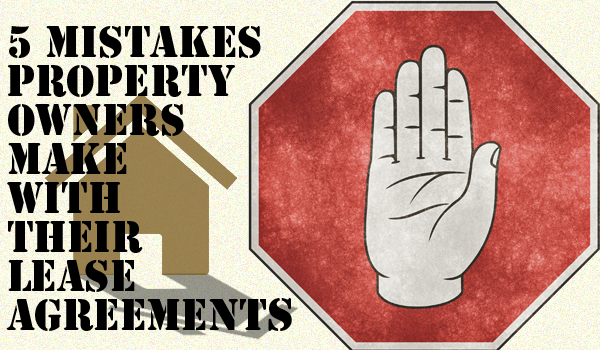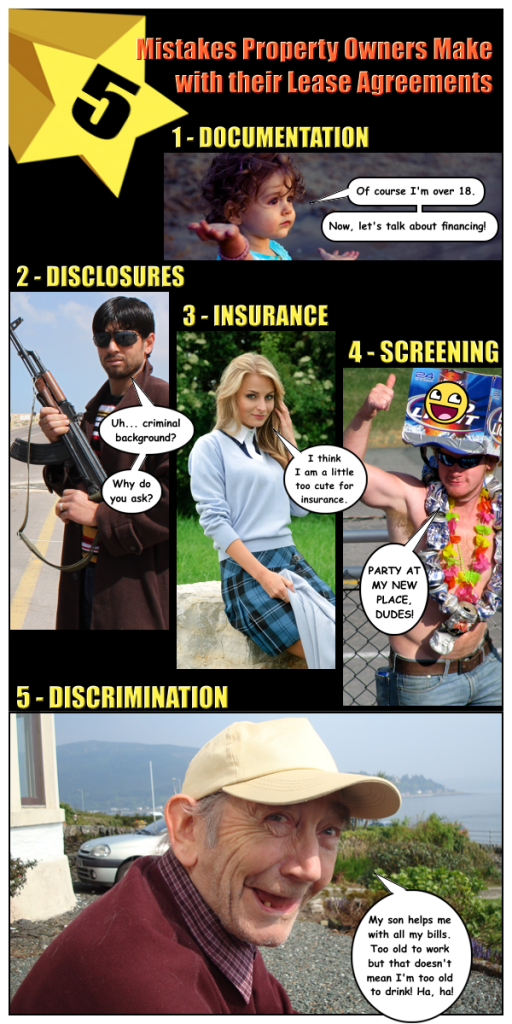5 Mistakes Owners Make When Drafting a Lease Agreement

In this economy, it seems like more people than ever before are becoming landlords, whether that was in their original plans or not. If you’re looking to move, but you can’t sell your home without losing money, renting it out is a great option. In an effort to save money, many people are opting to manage their own properties instead of hiring a management company. If you find yourself renting out property, whether a house, a condo, or an apartment, just make sure that you draft a strong lease agreement that will protect both your rights and the rights of your tenant. This agreement needs to be clear, well organized, and detailed. Here are five mistakes to avoid when drafting your own lease agreement.
1. Relying on Verbal Agreements
As much as you like your new tenants and hope that they will pay their bills on time and take good care of your property, you simply cannot afford to make the mistake of only making verbal agreements. Discussing your terms and shaking on it isn’t going to cut it. To protect yourself and your tenant, you must draft a legally binding written agreement, signed by both parties.
2. Writing a Vague Agreement
If ever there was a time for precision and detail, this is it. Don’t just throw together some sloppy agreement and have your tenant sign at the bottom. You need to list the property address, the length of the lease including the specific dates of that time frame, any specific regulations regarding pets on the premises, any damage already present in the home, and other details like eviction policies and late payment fees. The more specific you are, the easier it will be to sort through any problems that may come up in the future.
3. Forgoing a Background Check
As much as you might like to simply trust everyone that applies to rent your property, you must conduct a background check prior to accepting an application. Yes, it might cost a little bit to have this done. However, this information, including credit history and criminal background, is vital. You are entrusting someone with your property. It only makes sense that you need to do your homework in order to ensure that you find a trustworthy tenant.

4. Forgoing an Initial Inspection
Although it will take a bit of your time, make sure that you conduct an initial inspection of your property with your tenant. During this inspection, make a written list noting any damage to the property including stains in carpeting, nail holes in the walls, and other issues related to the structure and cosmetic appearance of the property. Once the list is complete, both parties should sign and date the document. This will come in handy down the road when your tenant is preparing to move. At this point, you can walk through the property again and it will be clear what damage occurred after the tenant took up residence in the unit. This will allow you to receive proper payment for any repairs you need to make.
5. Forgetting to Collect a Deposit
Finally, it is imperative that you collect a deposit. You can include this stipulation in your property listing and you should also detail the amount of the deposit and the parameters for refunding the deposit in your lease agreement. You may want to collect the equivalent of one month’s rent at the beginning of the lease and stipulate that a certain percentage of the deposit will be refunded when the lease is concluded. It is wise to make a portion of the deposit non-refundable to cover the cost of having the property cleaned in between tenants. You will also want to state in your lease that the cost of repairs for any damage caused by the tenant will come out of the deposit. A deposit adds an extra level of security for you as a landlord and gives your tenant added incentive to pay their rent on time and take care of your property.
Derek Coulter
Latest posts by Derek Coulter (see all)
- Attend a Funeral & Estate Planning Seminar - March 3, 2015
- Surrogacy: Creating Families or Scandals? - September 8, 2014
- Business Dispute: San Diego Comic Con Sues Salt Lake City Comic Con - August 22, 2014
- What Do I Do If I’m in a Business Dispute? - July 18, 2014
- Business or Personal? Issues Causing Businesses to Fail - June 26, 2014

Leave a Reply
You must be logged in to post a comment.